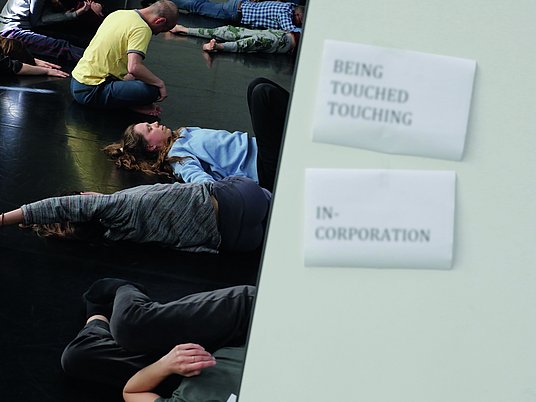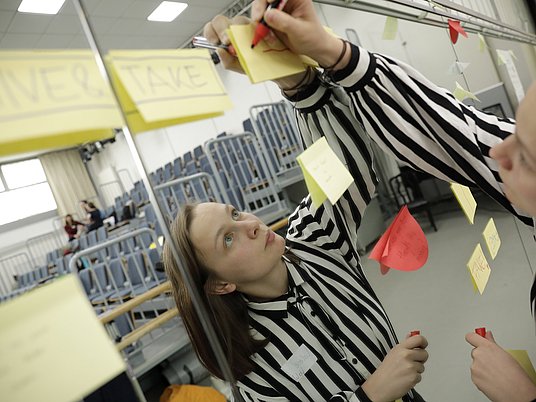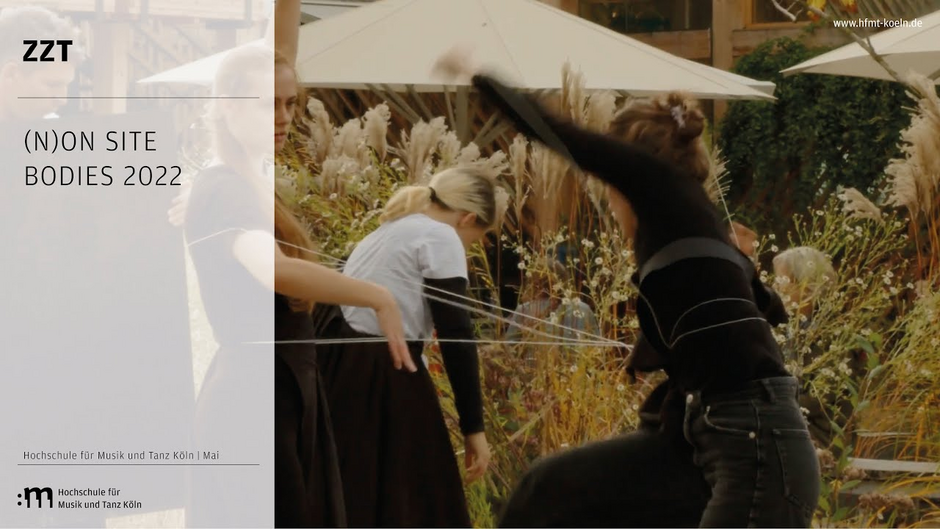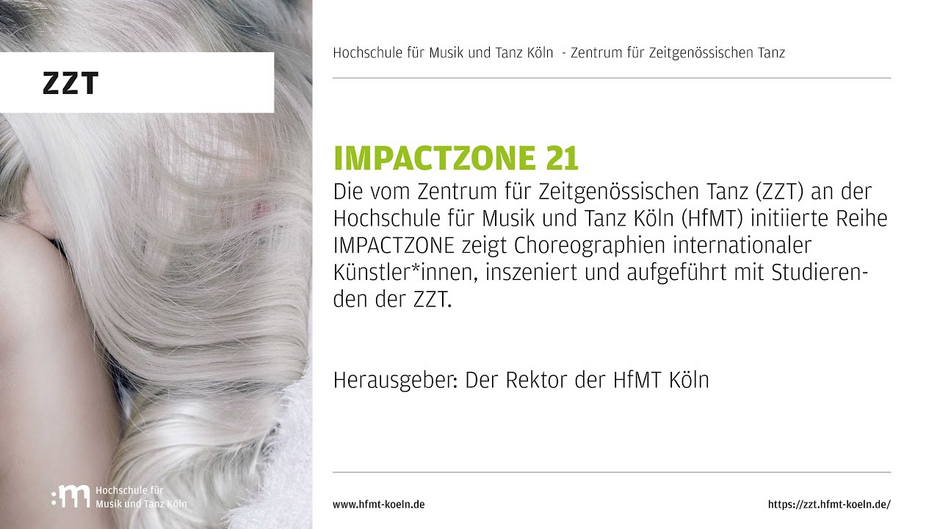Master of Arts -
Dance Studies
Aesthetic, social and political approaches to dance
What does dance do? What is set in motion when people dance? How is knowledge about moving bodies produced on stage, in clubs, in urban dance venues, in public spaces, in museums, archive building, at demonstrations, in rituals, in living rooms or on social media? Dance moves at the interfaces of culture, history, philosophy, politics, sociology and technology - whether as social choreography, performative practice, or a transcultural form of expression.
The MA Dance Studies program offers you the opportunity to explore dance, choreography, and the body in all their diversity. We examine diverse content of dance through interdisciplinary methods. You will study in the creative environment of an arts university that is close to dance practice and in collaboration with the German Dance Archive Cologne. Individual mentoring of an international team and external projects with exciting partners will support you in pursuing your questions and finding independent and creative research approaches.
If you have any questions about the program, please contact the appropriate contact person(s).
The MA Dance Studies program is directed by Prof. Dr. Yvonne Hardt.
If you’d like to stay informed about our activities, feel free to sign up for our newsletter and follow us on Instagram.
Basic information
| Degree | Master of Arts |
|---|---|
| Period of study | 4 Semester |
| Course begin | Wintersemester |
| ECTS points | 120 Credits |
| Continuing study options | Doctorate |
Study structure and content
Dance studies is a dynamic, young and interdisciplinary field that brings together numerous scholarly and artistic perspectives.
The program focuses on the historical, political, and aesthetic dimensions of dance and movement. Students reflect on dance and body techniques. They work on topics such as dance in global contexts, artistic research, cultural education and mediation, and research of forgotten dance histories. They engage intensively with movement analysis, creative and journalistic writing, dramaturgical working methods, and the development of their own choreographic ideas.
Against the backdrop of theories on body concepts, media and gender as well as anti-colonial and critical perspectives, the programme offers a variety of formats that promote an open culture of discussion and methodological diversity. Projects with partners such as Tanzhaus NRW, TanzFaktur, PACT, Kolumba, Quartier am Hafen or nrw landesbuero tanz also enable students to gain practical experience in the field.
Personal mentoring is very important in the MA Dance Studies and supports the development of an independent academic position and creative research approaches. This culture of promoting and valuing methodological and thematic diversity is also reflected in the composition of the dedicated team: Prof. Dr Yvonne Hardt, Prof. Dr Sevi Bayraktar, Jun. Prof. Dr Constanze Schellow, Dr Johanna Hörmann and Johanna Kasperowitsch who present a rich spectrum of research approaches, focal points, contexts, and networks to students through their respective expertise.
Thanks to the excellent infrastructure and the lively dance scene in North Rhine-Westphalia, the Cologne Dance Archive, and diverse perspectives in teaching and research at the CCD, students can expect an exciting and interdisciplinary education!
The MA program is aimed at anyone who is interested in dance, choreography or fundamentally in bodies in movement from a scholarly perspective. An application is therefore possible with any BA degree.
Module 1: Methods of Dance Science
An overview of problem areas, issues, terminologies and research perspectives of the field of study is provided here. Through intensive reading practice, students are motivated to acquire a critical scientific perspective so that they can independently research dance studies topics and reflect on their respective methods. These range from movement and discourse analytical methods to qualitative empirical and ethnographic methods to collective research designs. Complementary exercises will explore fields of work in dance studies at the interface with dance practice. Practical dance courses are included with regard to their potential to complement the dance-scientific spectrum of methods with body-reflexive analytical competencies.
Module 2: Dance Historiography
The module serves to convey historiographical procedures and a reflection on historiography that aims to critically question the canon of dance studies research in particular. In this context, global or informal practices or different social, national or cultural narratives come into view in their materiality, emergence and effectiveness.
Students are given the opportunity to develop critical and performative perspectives on dance history(s) in the practical dance elaboration of (re)constructions. In exercises at the German Dance Archive Cologne, they acquire knowledge in research and source study and work, for example, on the edition and web presentation of estates. This practical level of experience is linked to a further discussion of innovative approaches to what archives and memory cultures can be in dance and in relation to movement and body-related practices. Or with how movement and bodies report on things that find no place in the archive and how they enable a critical investigation of dance history.
Module 3: Composition, choreography and dramaturgy
In this module, compositional, choreographic and dramaturgical methods are theoretically and practically elaborated and reflected upon. "Composition", "choreography" and "dramaturgy" are thereby understood beyond the context of stage and theater as situated concepts in a broader perspective. In addition to teaching historical and contemporary concepts of choreography and composition, the module encourages transfer between academic and dance practice through cross-curricular collaborative formats in Department 7/ZZT and regular collaborations with institutions outside the university. In dialogue with analyses of a wide variety of aesthetic, dramaturgical and choreographic working methods, ideas and concepts for own and collective projects are developed and implemented. The module also includes introductions to aspects of project management, writing grant proposals, and institutional policy issues.
Module 4: Body / Arts / Media in a Global Context
Students engage in contemporary developments in diverse fields of dance and bring translocal connections into dialogue with their own research and practice. By interweaving arts and media, the module provides students with the opportunity to engage and connect a wide range of perspectives and interests, including music, visual arts, theater, performance, and artistic expressions in everyday life such as forms of protest - related to a variety of global contexts. Central to this is the theoretical engagement from a decolonial stance, for example to consider the politics of concrete aesthetics or curatorial strategies. Critical theories ('gender', 'race', ethnicity, dis/ability, sexuality) are discussed in this practically oriented field of study with reference to diverse cultural and political settings. Opportunities and problems of comparative research strategies are discussed. Students are encouraged to conduct their own artistic and scholarly research projects that experiment with the use of various media, including web-based formats, for example, to contribute to an expansion of the public reach of dance as a field of aesthetic, cultural, and political inquiry.
Module 5: Research module
This module offers students the opportunity to independently research a freely chosen dance-scientific issue. The knowledge and skills acquired during the course of study are to be applied and tested in a practical manner. The module will conclude with a format in which students publicly communicate their research process as well as their findings in a presentation. In this module, students also learn to write a research exposé for their MA thesis and to develop and discuss a procedure for it.
Module 6: Examination module
In this module, students write the master's thesis and take an oral examination on it.
Application and aptitude test
Applications are submitted online via the muvac platform. All information on the procedure can be found on our application page.
Admission requirements
- First university degree (e.g. BA degree in subjects such as dance, theater or music studies, cultural or social sciences, or in other fields that have provided an initial exposure to the body, dance, choreography, and the social and political interaction of moving bodies in a range of spatial contexts). In individual cases, such as the presence of an artistically oriented BA degree, admission may be conditional on attendance of additional Dance Studies courses in the BA Dance program.
- Very good German and English language skills. Courses are taught primarily in German, but English-language literature is included.
Application documents
The following documents are required for the application:
- Letter of motivation
- Curriculum vitae
- Proof of completion of a relevant university degree (certified copy)
- Submission of an academic work sample on a topic or issue from the broader thematic field of dance, performance, body practices or (social, political, aesthetic) movement research - e.g. BA thesis or excerpts thereof, term papers, essays). Alternatively, written reflections of own artistic works (at least 10 pages each) may be submitted. The submitted text should give insight into the analytical and contextualizing skills of the applicant.
- Language certificate, if applicable
Application deadline
Application deadline is June 1st of each year for a study start in the winter semester. If you have any questions, please do not hesitate to contact Prof. Dr. Yvonne Hardt.
Course of studies and examination regulations
You can find the course of study and the examination regulations under Documents & Downloads.
Prospects after graduation
The program qualifies students for further careers as well as doctoral studies in the field of dance and cultural studies or in all scientific fields in which a critical methodological approach is a prerequisite for a decided examination of bodies, movement, and processes of spatial orders. It also qualifies students for work in theaters and other cultural institutions in areas such as curation, cultural management, dramaturgy, production and communication. Further obvious fields of activity can be found in cultural policy, in archives and publishing houses, e.g. as an editor or critic). The systematic promotion of experience with transfer processes related to forms of knowledge and methods in dance also enables graduates to transfer the skills and knowledge they have gained in the program to other professional contexts.
Documents & downloads
Further downloads can be found on our central download page .
Current events
Studiotheater ZZT Köln Nippes
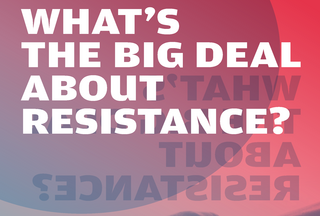
Studiotheater ZZT Köln Nippes

Studiotheater ZZT Köln Nippes

Studiotheater ZZT Köln Nippes

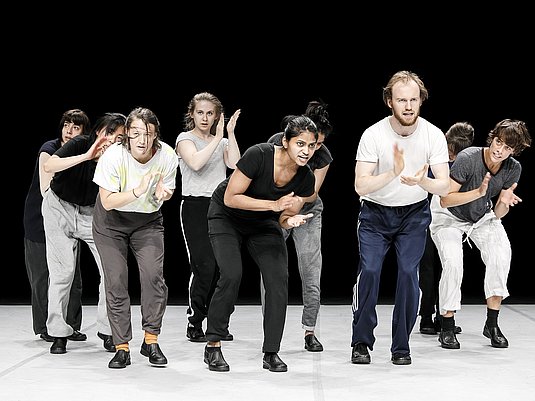
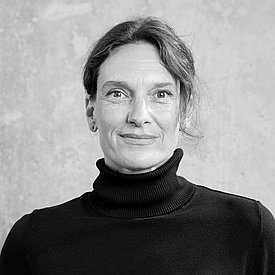
Dean Department 7/ZZT
|
Yvonne.Hardt@hfmt-koeln.de |
|
| Telephone |
+49 (0)221 / 28380 - 388 |
| Address |
Hochschule für Musik und Tanz Köln Turmstraße 3-5 50733 Köln |
